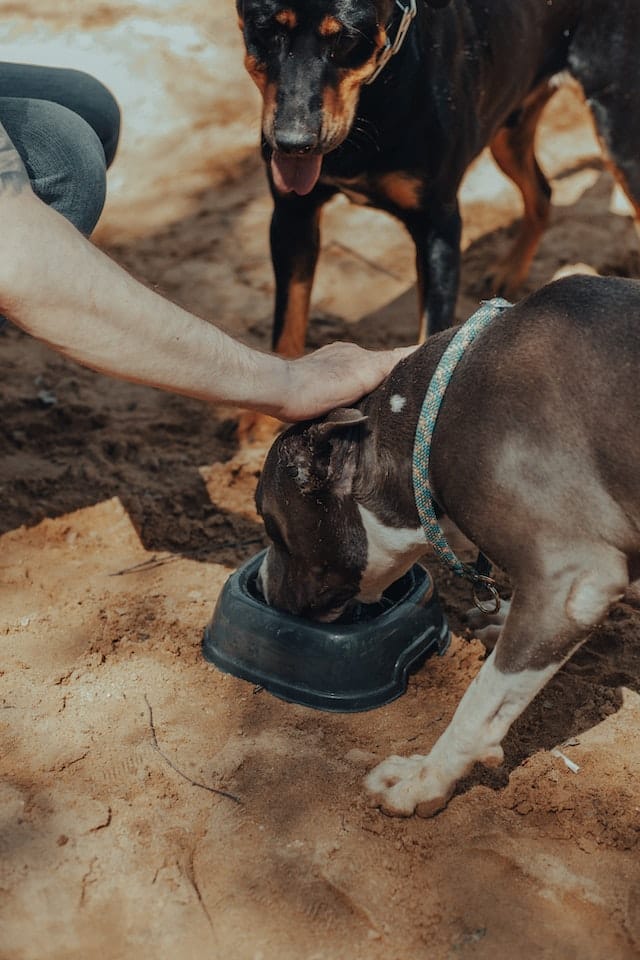
Why Is My Dog Always Hungry
Dogs are some of the hungriest animals in the world, and if your dog is always hungry, there could be a number of reasons why.
To address your dog’s ongoing hunger and find a solution for this behavior, it is important to understand the underlying causes and work closely with your veterinarian or dog trainer.
By paying attention to your dog’s behavior, you can help restore balance to its diet and keep them healthy and happy.
What is the normal appetite in dogs?

The normal appetite in dogs can vary greatly from dog to dog and also depends on several factors, including:
- Age
- Breed
- Size
- Activity
- And health status.
In addition, many active dogs will require more calories than dogs that are more sedentary, as their increased physical activity levels will increase their energy requirements.
Ultimately, it is important to work closely with your veterinarian or dog trainer to determine the appropriate amount of food for your individual dog based on these various factors.
What causes increased appetite in dogs?

Some of the most common underlying causes of increased appetite in dogs include:
A change in diet
A change in diet can often be one of the main factors that lead to increased appetite in dogs.
This may occur if your dog is switched from adult food to a portion of puppy food or if you are feeding a clinical diet and switching to something different.
An overactive thyroid gland
An overactive thyroid gland, known as hyperthyroidism, can also lead to increased appetite and weight loss in dogs.
This is caused by an increase in the production and secretion of thyroid hormones and should be addressed promptly with your veterinarian.
A canine growth disorder
Canine growth disorders, such as hypothyroidism and Cushing’s disease, can also lead to increased appetite and weight gain in dogs.
These disorders are caused by hormonal imbalances that should be evaluated and treated accordingly by your veterinarian.
Medications or supplements
Medications or supplements can also lead to increased appetite in dogs.
If you suspect your dog is taking more food than usual due to a medication or supplement, be sure to speak with your veterinarian about possible alternatives.
Conditions such as diabetes, Cushing’s syndrome, and cancer
Other factors such as diabetes, Cushing’s syndrome, and cancer can also cause dogs to feel hungrier than usual, so it is important to work with your veterinarian if you notice that your dog has increased appetite or weight gain.
To determine the root cause of your dog’s ongoing hunger, you must speak with your veterinarian or dog trainer, who can help you create a personalized treatment plan and lifestyle changes to help address your dog’s appetite.
What should you do if your dog is always hungry?

If you suspect that your dog is always hungry, there are several steps you can take to address this behavior. These includes:
Changing your dog’s diet
If you suspect your dog’s appetite is being driven by a change in its diet, work with your veterinarian or dog trainer to find more appropriate food for your pet.
This may involve switching to a different brand or formulation of food or adjusting the portion size and frequency of meals.
Providing regular exercise
In addition to addressing your dog’s diet, it is important to ensure that you are providing regular exercise.
This can help keep their energy levels in balance, as well as potentially reduce their overall hunger and food intake.
Monitoring other health factors
Other health factors, such as changes in thyroid hormone levels or conditions like diabetes and cancer, can also contribute to increased appetite.
If you suspect a medical issue is contributing to your dog’s hunger, work with your veterinarian to monitor their health status and develop an appropriate treatment plan.
Ultimately, the key to addressing ongoing hunger in dogs is to work closely with your veterinarian or dog trainer to find the right behavioral and lifestyle changes that will help keep your dog feeling happy, healthy, and well-fed.
Summary

If your dog is always hungry, it is important to work with your veterinarian or dog trainer to identify the underlying cause and develop a tailored treatment plan.
Some common factors that can contribute to increased appetite in dogs include changes in diet, an overactive thyroid gland, canine growth disorders, and certain medications or supplements.
To address your dog’s hunger and help them feel satisfied and well-nourished, you may need to change its diet, exercise routine, or overall health status.
Additionally, be sure to remain attentive and monitor your dog’s behavior for any new or concerning symptoms that may indicate a more serious underlying condition.
With the right care and attention, you can help keep your dog happy and healthy for many years to come.


GIPHY App Key not set. Please check settings